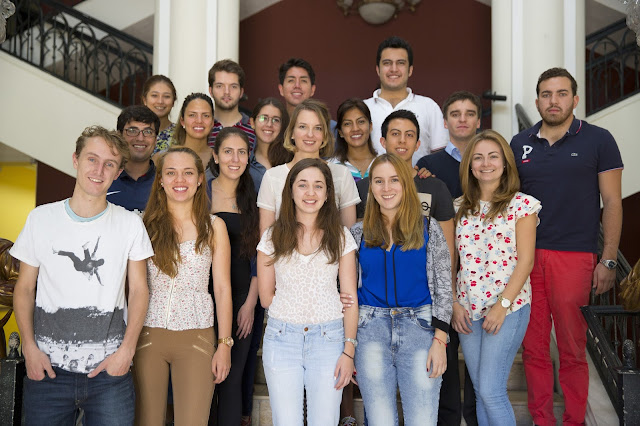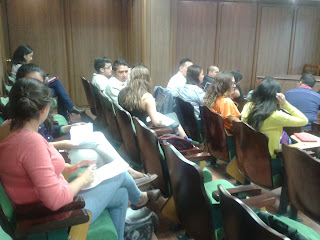Pioneers of Comparative Constitutional Law
In the
spring semester of the academic year 2015-2016 the Law School of USFQ was the
first in the country to offer Comparative Constitutional Law in English.
 |
| Students and Professor |
Since
Montesquieu wrote about how the different spirits of the peoples affect social
conditions and law in 1748, the discipline of comparative constitutional
scholarship made its way to the curriculum of the top-ranked law schools. After
some important scholarly works in the first half of the twentieth century and
the first university courses in the United States in the 1950s, the field lives
its renaissance since the 1980s. The Canadian Charter of Rights and Freedoms,
the return of Latin America to the democratic constitutional system, the
transition to rule of law in Central Eastern Europe and the end of apartheid in
South Africa were all a boost for the growing influence of this discipline. The
establishment of the International Journal of Constitutional law, not much more
than just a decade ago, in 2003, marks the influence and recognition of
comparative constitutional law.
By now,
not only scholars, but judges, practitioners, and policy-makers have an
ever-expanding interest in comparative constitutional law thanks to the
transnational migration of constitutional ideas and the growing importance of
the insight that constitutions do not exist in a vacuum. The distinctly
cosmopolitan view, that those students who are introduced to this field gain,
is that culture, economics, history, institutional structure are all crucial
for the understanding, reasoning and deciding constitutional law cases.
What is
perhaps the most important is how through the unique viewpoint of comparative
constitutional law we recognize the value of being faithful to the distinctive
method of legal thinking. This is why the course lays a big emphasis on
comparative constitutional reasoning and interpretation. Even if sometimes we
have diverse questions with diverse answers, one thing will always make the
dialogue meaningful and worthy, and this is the way how we seek the answers: responsibly, openly, with attention to all
relevant details, and reflecting on our own self. That means being faithful to
the method, which is the basic concern in this course too.
Come, and
be part of our class next year!
Pioneros en Derecho Constitucional Comparado
El Colegio de Jurisprudencia de la Universidad San
Francisco de Quito, en el segundo semestre del año académico 2015 – 2016, se
convirtió en la primera facultad del país en ofrecer la clase de Derecho
Constitucional Comparado en Inglés.
En 1748, Montesquieu escribía sobre el espíritu
individual de cada persona y como éste afecta las condiciones sociales y legales.
Este es el punto de partida para el crecimiento del derecho constitucional
comparado académico entre las facultades más prestigiosas de Jurisprudencia. El
derecho constitucional comparado entra en su etapa de renacimiento desde 1980, después
de haber tenido importantes artículos académicos en la primera parte del siglo
veinte y la implementación de cursos de derecho constitucional comparado en las
universidades de Estados Unidos en los años 50. Factores como: la Carta
Canadiense de Derechos y Libertades, el restablecimiento de la democracia
constitucional en América Latina, la transición a estados de Derecho en Europa
del Este y el fin de la segregación racial en Sudáfrica, han sido cruciales
para impulsar el crecimiento de este nuevo derecho comparado. Finalmente, hace
no más de una década, en el año 2003, se reconoce la influencia del derecho
constitucional comparado con la creación del International Journal of
Constitutional law.
Actualmente, el derecho constitucional comparado no sólo
es de interés de académicos, también ha llamado la atención de jueces, abogados
y legisladores a nivel mundial. El creciente interés de esta disciplina se da
por la globalización de ideas constitucionales y la creciente visión de que las
constituciones no existen en vano. Los alumnos que estudian esta rama del Derecho
adquieren una visión cosmopolita en la cual, la cultura, la economía, la
historia y la estructura institucional resultan cruciales para entender,
razonar y resolver casos de derecho constitucional.
Sin embargo, lo más importante de introducirnos en el
curso de Derecho Constitucional Comparado es lograr entender el valor
distintivo del pensamiento jurídico. Incluso si en
algunas ocasiones tenemos preguntas y respuestas distintas ante una misma
situación, hay una cosa que hará que el diálogo sea significativo y valioso, y
esto es la forma en que buscamos las respuestas que deberá ser de manera
responsable, con mente abierta, prestando atención a los detalles, y con un
reflejo en nosotros, en nuestro ser. Siempre manteniéndonos firme al método.
¡Te invitamos a ser parte de nuestra clase el próximo
semestre!











